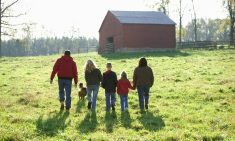In the final installment of our five-part series featuring farm families leading change, we hear from the Walshes — how they build a strong business by focusing first on a strong family
Earlier in the series we highlighted families who have made bold strides through their business operations and family planning initiatives (you can find them all, here). This month we take a deeper dive into a family that prioritizes how they work together on the farm and we explore how their open, honest approach to communication is putting their farm and business operations in line for continued success.
The Walsh family owns and operates a successful fourth-generation beef and cash crop operation at Otonabee, an hour and a half east of Toronto. In addition to their farming operation, the Walsh family also runs excavation and snow removal businesses.
Read Also

Part 4: Financial disagreements between farm siblings
A six-part series that looks at the challenges sibling conflict can have on the farm business and family business relationships.
This diversification increases the need for strong communication amongst the family members, especially when looking at balancing priorities for both long- and short-term planning.
Each of the four siblings — Cody, Jordan, Sheldon and Danielle — has their own unique role in the businesses, but they all understand the need to prioritize working relationships amongst family members. They also know that maintaining a healthy balance in their personal and working lives is essential to their continued growth.
“We feel it is just as important to maintain our family relationships, even outside of the farm,” says Jordan. “Finding opportunities to spend some quality time with our wives and kids, making sure everyone is happy and mentally healthy is just as important to us as the success of the business.”
This is an important, modern mindset. For many years we have seen farming families pulled apart due to the stresses that farming in today’s agriculture can place on family relationships, with higher debt loads, the changing climate and increasingly competitive markets all pushing today’s farmers harder than ever. Even the closest of families can feel the pressure.
Says Sheldon: “We have our stormy times just like all families out there, but we really understand how each other works, we have good clarity in our roles and we know where each of our strengths lie — this helps to keep us grounded in our decision-making.”
In addition to maintaining family relationships, taking some personal time away from the farm has also been critical to the growth of the farm business itself.
“We’ve found that some of our best business decisions and our best business planning sessions have come from when we have been able to take a little time away from the farm and think with a clear head,” says Jordan.

Taking time away from the farm isn’t always simple but on the Walsh farm it’s easier because they are committed to transparency around the roles and responsibilities of each member of the farm team. It makes it so much easier for another family member to step in when needed.
The family leverages these roles in other ways too. “Even though we have our areas of strength that we take the lead on, we still share our thoughts, concerns and beliefs with the rest of the team, even though we don’t necessarily need to,” says Sheldon. “It’s always good to keep everyone informed on what’s going on in the business.”
It has taken some time for the family to get to this level of success with their communication practices, yet it’s also true that some of the best practices on the farm are ones that have been passed down through the generations.
“We’ve learned lots through trial and error,” says Jordan. “It might not always have seemed like an advantage at the time, but Dad’s always allowed us to make some mistakes even if he knew it may not be the best decision at the time.”
This is a key takeaway from our discussions with the Walsh family. Letting go of some responsibility and allowing the next generation to learn the hard way is something we are seeing less and less of on today’s farms.
In fact, one of the most common barriers to succession planning today is the fear of letting go. This applies not only to the actual ownership of the farm, but also to letting go of some of the control, responsibility and decision-making that comes with running the farm.
To ensure our farms’ successors are best prepared for the future, it is essential that they get the chance to make decisions and accept the consequences of their actions, whether positive or negative, and to ensure they can learn and take a new approach in their next challenge.
In the case of the Walsh family, the next generation was able to make mistakes on the path to where they are today. When discussing the impact their dad has made on their communication style, Jordan and Sheldon both highlighted their appreciation for his ability to allow them some of the decision-making over the years.
“He’s never just shut down our ideas or kept us under his thumb,” says Jordan. “We’ve been able to learn some valuable lessons by making the same mistakes he did along the way.”
At the end of the day, the Walsh family understand that to run a successful family farm, significant emphasis needs to remain on the family aspect.
“We see the importance of maintaining family harmony. If we, or our kids, can’t get along, then what we are doing here?” says Sheldon. “All the hours we are putting in would be pointless. For us, farming isn’t just our job, it’s our legacy that we hope to see continued by our children for generations to come.”















